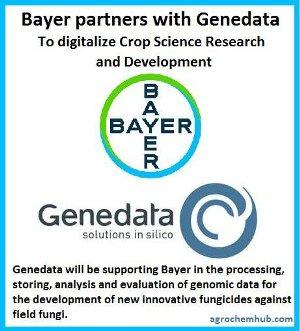MONHEIM, 28 September 2018 : Bayer and Genedata, a leading provider of advanced software solutions for life science research and development, today announced the extension of their long-term partnership. Genedata supports Bayer’s Crop Science Division to digitalize R&D processes and this extended partnership now includes a license to the Genedata Selector platform to support Bayer’s global discovery process and data management efforts. Genedata will be supporting Bayer in the processing, storing, analysis and evaluation of genomic data for the development of new innovative fungicides against field fungi.
“The intelligent organization of large data volume is central to successful research and development of new crop protection products,” says Dr. Michael Edmund Beck, Principal Scientist & Head of Computational Life Science for R&D Small Molecules at Bayer, located in Monheim, Germany. “I like to compare Genedata's work with the structured organization of a library in which you can easily and quickly find the book you are looking for,” Beck adds. “Our many years of experience in working together so far have been very positive.”
“We are excited that Bayer has extended its partnership with Genedata Selector to support the digitalization of its R&D processes,” said Dr. Othmar Pfannes, CEO of Genedata. “Genedata remains very committed to supporting innovative leaders in Agroscience, like Bayer, with its scalable and integrated bioinformatics platforms.”
For over a decade, Genedata and Bayer have held a long term professional relationship. NGS (Next-Generation Sequencing), microarray and other high throughput omics technologies have been used to overcome traditional low-throughput science in plant physiology and Genedata has been the leading enterprise software platform for the management of this information. The complexity of research for agrochemical companies is born from the number of species, genomes and related information needed for the discovery of new crop protection solutions. The use of Genedata Selector will enable Bayer to provide global data access to its scientists as an entry point to collaborate, harmonize and streamline processes toward finding innovative solutions.
Genedata Selector has been addressing the key bioinformatics challenges for crop protection and smarter breeding for over 20 years. This scalable, integrated, and secure enterprise software solution is designed to handle today's and tomorrow's informatics challenges:
• Genome complexity: Crop-related genomes are large, complex, and highly variable across organisms. Genome sequences, assemblies and gene models can be incomplete or non-existent.
• Information diversity: The various types of information from plant breeding experiments, crop protection studies and chemical compound screenings need a centralized platform where all data can be stored and analyzed for linkages and easily accessible to all team members involved.
• Incorporation of new data: Everyday, new technologies, genome sequences, gene annotations, and genetic markers are being discovered. Now, more than ever, a centralized way to manage all of this data is crucial to the future of modern farming.
• Collaboration and communication: With locations (fields, farms, etc.) and labs all over the world, data harmonization and communication support of interdisciplinary teams is key success factor.




















